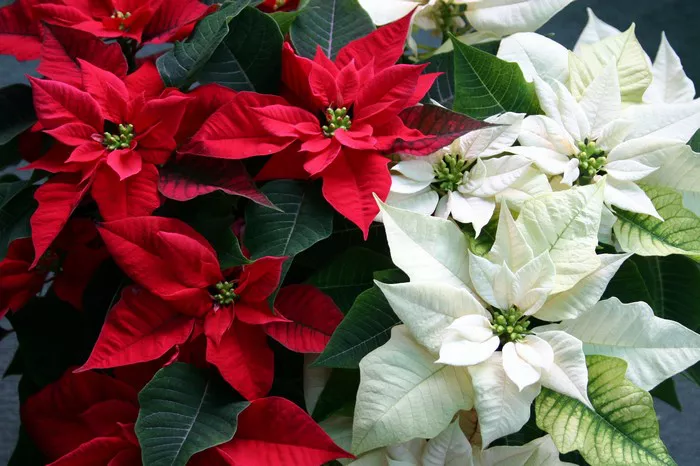Poinsettias are popular plants, especially during the holiday season. Their bright red and green foliage adds festive cheer to homes. However, there is a common belief that poinsettias are highly toxic to animals. This article aims to explore whether poinsettia flowers are truly poisonous to animals, examining scientific evidence and expert opinions.
What Are Poinsettias?
Poinsettias, scientifically known as Euphorbia pulcherrima, are native to Mexico. They are popular as holiday decorations. Poinsettias are known for their vibrant red, white, pink, or marbled bracts, which are often mistaken for flowers. The true flowers are small and yellow, located at the center of the bracts.
Historical Beliefs About Poinsettia Toxicity
The belief that poinsettias are poisonous dates back to 1919. According to legend, a child in Hawaii died after eating a poinsettia leaf. This story, though largely debunked, contributed to the plant’s reputation as toxic. Over time, this belief has been reinforced by warnings from various sources.
Scientific Evidence on Poinsettia Toxicity
Many studies have investigated the toxicity of poinsettias. Research indicates that poinsettias are not as toxic as once believed.
1. Animal Studies: Studies on various animals, including dogs and cats, show that ingestion of poinsettia leaves or bracts generally causes mild symptoms. These symptoms may include vomiting, drooling, or mild irritation to the mouth and stomach. However, severe poisoning is rare.
2. Human Studies: Similar studies on humans also indicate low toxicity. A study conducted by the American Journal of Emergency Medicine found that out of 849,575 reported cases of poinsettia exposure, none resulted in significant poisoning or death.
Symptoms of Poinsettia Poisoning in Animals
Though poinsettias are not highly toxic, animals may still exhibit symptoms if they ingest the plant. These symptoms are usually mild and short-lived.
1. Mild Symptoms: Symptoms may include drooling, vomiting, diarrhea, and mouth irritation. These symptoms are typically mild and resolve on their own without treatment.
2. Severe Symptoms: In rare cases, animals may experience more severe symptoms such as difficulty breathing, excessive drooling, or significant gastrointestinal upset. These cases are uncommon and usually involve the ingestion of large quantities of the plant.
Why Poinsettias Are Not Highly Toxic
Several factors contribute to the low toxicity of poinsettias:
1. Chemical Composition: Poinsettias contain compounds called diterpenoid euphorbol esters and saponins. While these compounds can cause irritation, they are not highly toxic. The concentration of these compounds in poinsettias is relatively low.
2 .Taste Deterrent: Poinsettias have a bitter taste, which discourages animals from eating large quantities. This natural deterrent helps prevent significant ingestion.
3. Natural Defenses: Animals often have natural defenses against consuming harmful plants. They may avoid eating plants with a strong or unpleasant taste.
Common Animals Affected by Poinsettia Ingestion
Though poinsettias are not highly toxic, some animals are more likely to be affected if they ingest the plant.
1. Dogs: Dogs are curious and may chew on plants. If a dog ingests poinsettia, it may experience mild gastrointestinal upset.
2. Cats: Cats are also known for their curiosity. Ingesting poinsettias can cause mild symptoms such as drooling or vomiting.
3. Small Pets: Smaller pets like rabbits or guinea pigs may be more susceptible to irritation from poinsettias. However, they are also likely to avoid eating large amounts due to the plant’s bitter taste.
Precautions for Pet Owners
While poinsettias are not highly toxic, it is still important to take precautions to protect pets.
1. Placement: Place poinsettias out of reach of pets. This reduces the risk of accidental ingestion.
2. Supervision: Supervise pets around holiday decorations. Ensure they do not chew on plants.
3. Alternative Plants: Consider using pet-safe alternatives for holiday decorations. Plants like Christmas cacti or rosemary are safer options.
SEE ALSO: Honeysuckle Plants and Their Harmful Effects on Dogs
Treatment for Poinsettia Ingestion
If a pet ingests poinsettia, monitor it for symptoms. In most cases, symptoms will be mild and resolve on their own. However, there are steps to take if a pet exhibits symptoms.
1. Monitoring: Observe the pet for signs of distress. Mild symptoms such as drooling or vomiting may not require treatment.
2. Consulting a Vet: If symptoms persist or worsen, consult a veterinarian. They can provide advice and treatment if necessary.
3. Avoiding Home Remedies: Do not attempt home remedies without consulting a vet. Some remedies can worsen the situation.
Myths and Misconceptions About Poinsettia Toxicity
Many myths and misconceptions surround poinsettias and their toxicity.
1. High Toxicity Myth: The belief that poinsettias are highly toxic is a common myth. Scientific evidence does not support this claim.
2. Human Fatalities: Stories of human fatalities from poinsettia ingestion are largely unfounded. Studies show that poinsettia exposure is not life-threatening.
3. Animal Fatalities: Similarly, reports of animal fatalities are rare and often involve other factors.
Other Holiday Plants That Are Toxic to Pets
While poinsettias are not highly toxic, other holiday plants pose greater risks to pets.
1. Mistletoe: Mistletoe can cause severe gastrointestinal upset, difficulty breathing, and even cardiovascular collapse in pets.
2. Holly: Holly berries can cause vomiting, diarrhea, and lethargy if ingested by pets.
3. Lilies: Certain types of lilies are highly toxic to cats and can cause kidney failure.
Conclusion
Poinsettias are not highly toxic to animals. While ingestion may cause mild symptoms, severe poisoning is rare. Pet owners should still take precautions to prevent pets from chewing on poinsettias. Understanding the true toxicity of poinsettias helps dispel myths and ensures a safe holiday season for pets and their owners.


